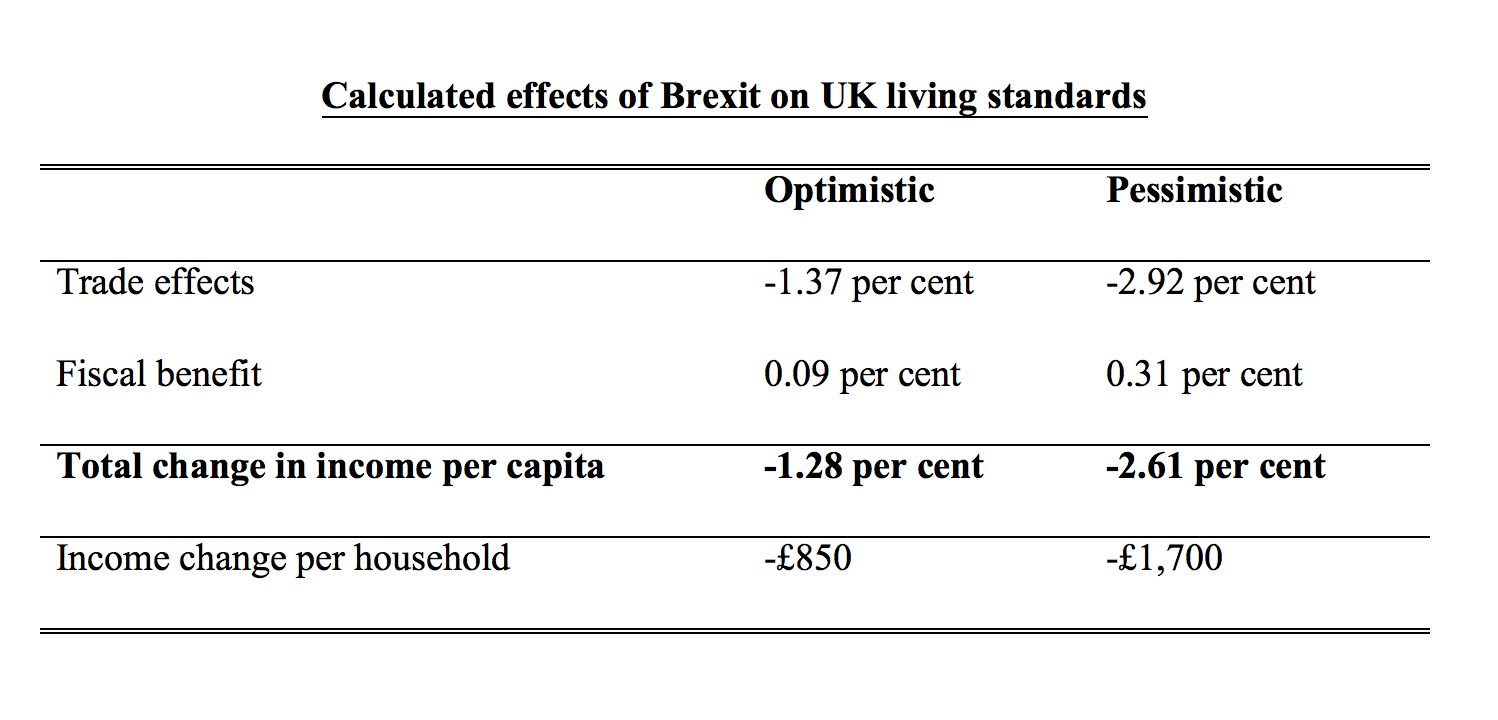The question is not whether Brexit will cost the UK in economic terms, but how much

For over two years, a research team at the Centre for Economic Performance (CEP) has been studying the likely impact of the UK leaving the European Union. Their latest report focuses on the impact of ‘Brexit’ through changing trade patterns. Under ‘optimistic’ assumptions, there is a fall in national income of 1.3 per cent (about £850 per household). Under ‘pessimistic’ assumptions, this doubles to 2.6 per cent. When the dynamic effects of higher trade costs on productivity are included, the cost may rise to between 6.3 per cent and 9.5 per cent in the long run.

A small percentage of the cost of Brexit (Credit: Cristiano Betta, CC BY 2.0)
There are many issues that will weigh in the minds of voters in the run up to the 23rd June EU referendum. Many people feel that they are oppressed by a remote, undemocratic super-state that can over-rule British laws. Others believe that the EU promotes better co-operation between communities that were at war for centuries. These views often stem from deeply held political and moral beliefs.
Economics can make a small contribution to the debate by considering what might be the material costs and benefits of leaving the EU. If there are economic benefits, then for Eurosceptics it’s a win-win. On the other hand, if there are economic costs to Brexit, then even a die-hard Leaver must consider whether the price is too high. Some might be prepared to pay any cost, for them it is ‘death before enslavement’. To most people however, it’s not so all-or-nothing. They will look at the likely costs and benefits, and this will help inform their decision.
Figuring out the economic costs and benefits of Brexit
An obvious benefit of Brexit is that the UK will not have to send so much money to Brussels. On net this is around 0.31 per cent of our national income. An equally obvious cost of Brexit is that trade between the UK and EU will be lower if the UK leaves than if it stays. The degree to which trade costs will be higher outside the EU is a big question. But it’s a fact that even when countries have comprehensive trade deals (such as Norway’s deal in the European Economic Area, EEA) there are still non-tariff barriers due to regulatory differences, border checks, rule-of-origin requirements and anti-dumping actions. This is why even Norway has been found to have less trade with the EU than would be expected from such a deep level of integration.
There are a rich menu of economic models to analyse the impact of trade arrangements, but it turns out that most of them have a pretty similar structure when it comes to thinking about welfare gains. Our work develops a state-of-the-art (but bog-standard) trade model plus industry-level data on exports and imports covering all sectors of the economy in every country in the world. This, plus an estimate of how trade responds to costs, enables us to figure out how trade patterns and living standards will change when trade costs (tariff and non-tariff barriers) change after Brexit.
Since it is hard to know precisely how trade costs will change after Brexit, we look at two stark scenarios. An ‘optimistic’ scenario is that the UK swiftly strikes a deal so that it gets deep access to the EU single market, like Norway. A ‘pessimistic’ scenario is that the UK is unwilling to accept the free movement of labour and the associated regulations that are part of the ‘access price’ to the single market and so will prefer the usual EU external tariffs. Trade will fall by more in this case.
The table shows the results of our analysis. There is a drop in income per person of 1.3 per cent in the optimistic case, which doubles to 2.6 per cent in the pessimistic case. This translates to a fall of between £850 and £1,700 per UK household.
Source: CEP calculations (Technical details available here). Income based on allocating GDP loss per household. For example, 1.3 per cent of UK GDP is £23 billion and there are about 27 million households.
Is the pessimistic scenario too optimistic? Probably yes
The calculations we make are very narrow. They assume away any positive effects that trade may have on productivity through more competition, innovation, foreign investment and migration. We also abstract away from the economic damage induced by the policy uncertainty in the very difficult negotiating period following a Brexit vote. Negotiations over new trade agreements could stretch over many years.
An alternative ‘back of the envelope’ way to estimate the effects of Brexit is to look at what actually happens when countries joined the EU compared with being in free trade areas like the European Free Trade Area or EEA. The trade effects are big – a jump of a quarter or more. Combining this with estimates of the impact of trade on GDP from real falls in trade costs leads to an implied fall of UK national income of between 6.3 per cent and 9.5 per cent. Interestingly, this is squarely within the range of values that others have estimated have been the historical benefits of the UK joining the EU of around 8 per cent to 10 per cent.
This tripling of the costs of trade loss are also consistent with the literature of economic research comparing the actual benefits of trade liberalisation (big) with those predicted from static models like those presented here (much smaller). Naturally, UK trade with the EU does not disappear in any scenario – there remains a ‘trade deal’ in all cases. It is simply that there is less than it would have been had the UK remained a member.
It makes little sense to point to a decline in the EU’s share of total UK trade over the last decade as evidence that the single market has ‘failed to reduce trade costs.’ This decade has witnessed the rapid growth of Asian trade powerhouses as well as the worst global economic crisis since the Great Depression.Britain’s trade with Europe has increased since 2000, it’s just that trade with China has increased much faster.
Is the optimistic case too pessimistic?
How could things turn out better? First, could the UK negotiate a sweetheart deal much better than Norway or Switzerland have managed? This seems unlikely. About half of the UK’s exports go to the EU, whereas only 10 per cent of the EU’s exports are destined for the UK, so the bargaining power is lopsided. What’s more, the EU will not want to be seen to be offering generous rewards for leaving as this will encourage other members to try the same trick. And in addition, all this assumes that everyone is behaving reasonably and rationally – unfortunately divorces tend to be much messier. Kicking the EU when it is undergoing a major refugee crisis and a long-running monetary crisis might provoke some very grumpy outcomes.
Second, could the UK strike better trade deals with non-EU countries like the United States, China and India than with the EU? Although the UK will not have to compromise with other EU members when doing such deals, it cannot offer access to the biggest single market in the world as the EU does (UK GDP is under a fifth of the size of the single market). The EU is in the final stages of negotiation with the United States and Japan on deals estimated to raise GDP by 0.6 per cent. If the UK cannot replicate these deals (and the United States has stated it is not interested in a UK-only deal), this will be a further income loss on top of the estimates here.
Finally, what about the promised bonfire of red-tape when we leave the EU? Being outside the EU would enable the UK in principle to jettison some irritating regulations. But it’s worth bearing in mind that being in the EU has not stopped the UK from having one of the most flexible product and labour markets in the OECD (behind only the United States and sometimes Canada).
The real question is whether much better regulation will really be forthcoming after Brexit. We often hear by Eurosceptics that “the 100 most burdensome EU regulations have been estimated to impose annual costs of £33.3 billion”. But what they neglect to mention is that the government impact assessments they cite also estimate that the same 100 regulations bring benefits to Britain of £58.6 billion per year! It’s been argued that by getting rid only of those regulations where costs are deemed to outweigh benefits, 0.9 per cent of GDP could be saved. About half of this is estimated to come from the Renewable Energy Strategy and the Working Time Directive. It’s unclear that tearing up these environmental and employment protections will be politically feasible or really as economically beneficial in the long run as the impact assessments find.
Is Brexit a price worth paying?
Many people may decide that knocking a grand or two off their salary or pension is worthwhile to get Brussels off their backs. Some – though probably fewer – might even say the same if the bill rises to over £6,000 a year. These are reasonable positions and every voter will make up their own mind over the price they are willing to pay. But those who say that leaving the EU is a win-win because Britons will both feel more free and become a lot richer are not being candid about the evidence. The standard trade models given here, calculations from trade and income differences of being in and out of the EU and also historical assessments show a consistent picture – Brexit will cost. The only question is ‘exactly how much’?
—
Please note: This articles summarises the study ‘The consequences of Brexit for UK trade and living standards’. The report has been attacked by Vote Leave. First, they say the report is EU funded. This is untrue: our work is funded by the UK’s Economic and Social Research Council (as a whole, CEP receives less than 5 per cent of its funding from the EU). Second, they say the authors lack credibility because we also supported Euro entry. This too is untrue: Professor John Van Reenen, who has been CEP Director since 2003, has never supported the UK joining the Euro. Vote Leave’s other points were all addressed by the original report and are amplified in the above piece.
This post represents the views of the authors and not those of Democratic Audit. It originally appeared on the LSE Politics and Policy Blog. Please read our comments policy before posting.
—
 Swati Dhingra is a Lecturer in Economics at the LSE.
Swati Dhingra is a Lecturer in Economics at the LSE.
 Gianmarco Ottaviano is Professor of Economics at the LSE.
Gianmarco Ottaviano is Professor of Economics at the LSE.
 Thomas Sampson is an Assistant Professor in Economics at the LSE.
Thomas Sampson is an Assistant Professor in Economics at the LSE.
 John Van Reenen is Professor of Economics at the LSE and Director of the CEP.
John Van Reenen is Professor of Economics at the LSE and Director of the CEP.






 Democratic Audit's core funding is provided by the Joseph Rowntree Charitable Trust. Additional funding is provided by the London School of Economics.
Democratic Audit's core funding is provided by the Joseph Rowntree Charitable Trust. Additional funding is provided by the London School of Economics.
The question is not whether Brexit will cost the UK in economic terms, but just how much https://t.co/w883aZb9Bx
[…] The question isn't whether Brexit will cost the UK in economic terms. How … A 'pessimistic'. Scenario is that the UK is unwilling to accept the free movement of labour and the associated regulations that are part of the 'access price'. To the single market and so will prefer the usual EU external tariffs. Trade will fall by more … Read more on Democratic Audit UK […]
The question is not whether Brexit will cost the UK in economic terms, but how much https://t.co/1uiFMyRO1E
The question is not whether Brexit will cost the UK in economic terms, but how much https://t.co/Q5Ta8GsR8y
The question is not whether Brexit will cost the UK in economic terms, but how much https://t.co/7YYoRyD6aE
The question is not whether #Brexit will cost the #UK in economic terms, but how much https://t.co/Lx38GEi4Pc
The question is not whether Brexit will cost the UK in economic terms, but how much https://t.co/62ODXjpfWf
The question is not whether Brexit will cost the UK in economic terms, but how much: https://t.co/4xjYL1Gynr
#Brexit @democraticaudit
The question is not whether Brexit will cost the UK in economic terms, but how much https://t.co/MOqnwLe6r4 https://t.co/yG7qIOW3Gk